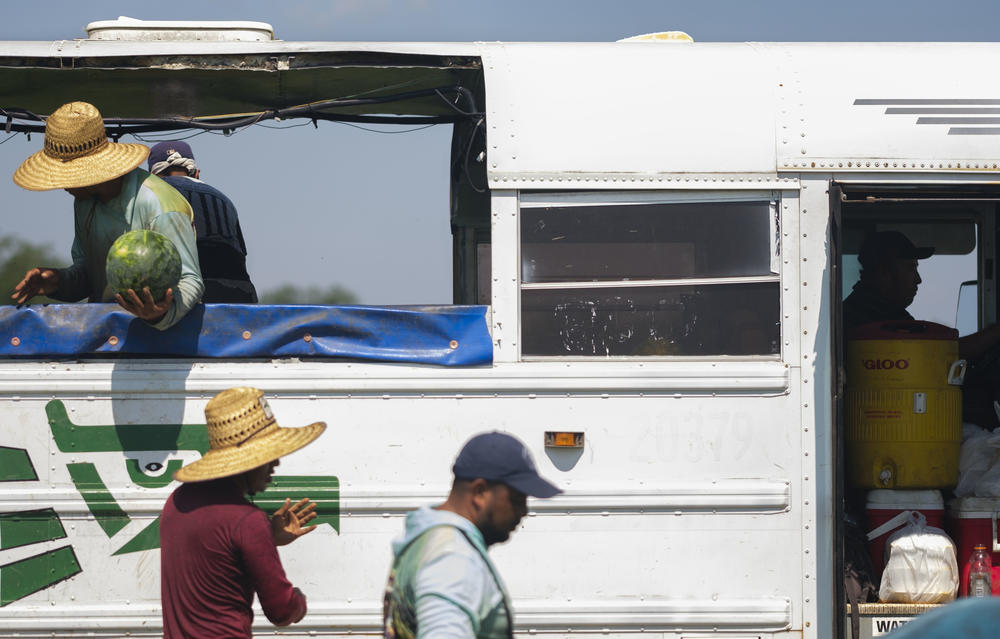
Section Branding
Header Content
Georgia growers part of group saying new rules for migrant farm workers go too far
Primary Content
LISTEN: A new rule from the U.S. Department of Labor that would allow some migrant farmworkers to self-organize has some Georgia growers accusing the federal agency of overstepping its bounds. GPB's Sofi Gratas reports.

A new rule from the U.S. Department of Labor that would allow some migrant farmworkers to self-organize has some Georgia growers accusing the federal agency of overstepping its bounds.
The complaint came as a lawsuit filed Monday in Brunswick by a group of Republican-led states that includes Georgia. The only two non-state entities involved are the Georgia Fruit and Vegetable Growers Association and a produce farm in Baxley.
A federal labor law passed in the 1930s exempts U.S. agriculture workers from being allowed to form unions. That law still rings true today.
Now, changes proposed by the Department of Labor aim to give migrant farm workers employed through the H-2A visa program protections around organizing. The H-2A program regulates the temporary hiring of foreign farm workers in the case that U.S. farm workers are not readily available.
But the new rule is clear in saying it doesn’t expect farmers to recognize unions — just to respect organizing efforts among H-2A workers without intimidation.
Even then, attorney Braden Boucek with the Southeastern Legal Foundation argues the plaintiffs don’t think the Department of Labor should have jurisdiction over who gets organizing rights.
“The interest here is constitutional separation of powers,” Boucek said. “If Congress wanted to change it, it would.”
Additionally, Boucek said the new rule would be “devastating” to the Georgia farms he’s representing.
“It is cost and also the burden that comes with compliance of a new rule that shouldn't apply to them,” he said. “Any rule requires them to figure out how to comply with it, and that's a cost that they have to absorb that they can never get back.”
The lawsuit comes after complaints over an approved wage rate increase for H-2A workers — up by $1 per hour from last year. Georgia Agriculture Commissioner Tyler Harper sent a letter to Congress in January highlighting his concerns.
“As one of the leading agricultural states in the nation, the H-2A program plays an important role in the success of our agriculture industry, but the program is quickly reaching a breaking point where the cost of using the program significantly outweighs its benefits,” Harper wrote.
But farmworkers employed under the H-2A program have faced their own challenges.
The new rule that includes protections for organizing is one piece of the Department of Labor’s efforts to reform the program that’s suffered from lack of oversight resulting in abuse.
Soli Mercado-Spencer with Georgia Legal Services represents farm workers in cases of employee discrimination and wage theft. She said farm workers under the H-2A program have not been guaranteed fair treatment.
“The new rule creates a process that ensures that when a worker is fired for cause, that is the legitimate cause,” Mercado-Spencer said. “That is really different. That did not exist before.”
Compensation in these situations has been nearly impossible, she said. That would change with the new rule, which would also guarantee things like written notice before termination and better transparency during recruitment, both abroad and once workers arrive here.
“It will make our job easier to help the workers, and it will make it easier for workers to advocate for themselves,” Mercado-Spencer said. “And even make it easier for the Department of Labor to take enforcement actions.”
Over 30,000 migrant farmworkers are employed in Georgia every year through the H-2A program.

